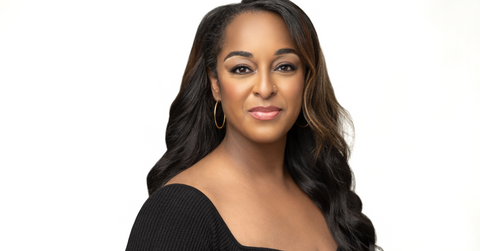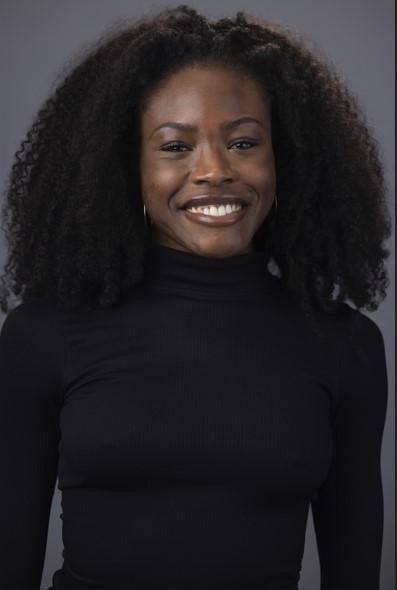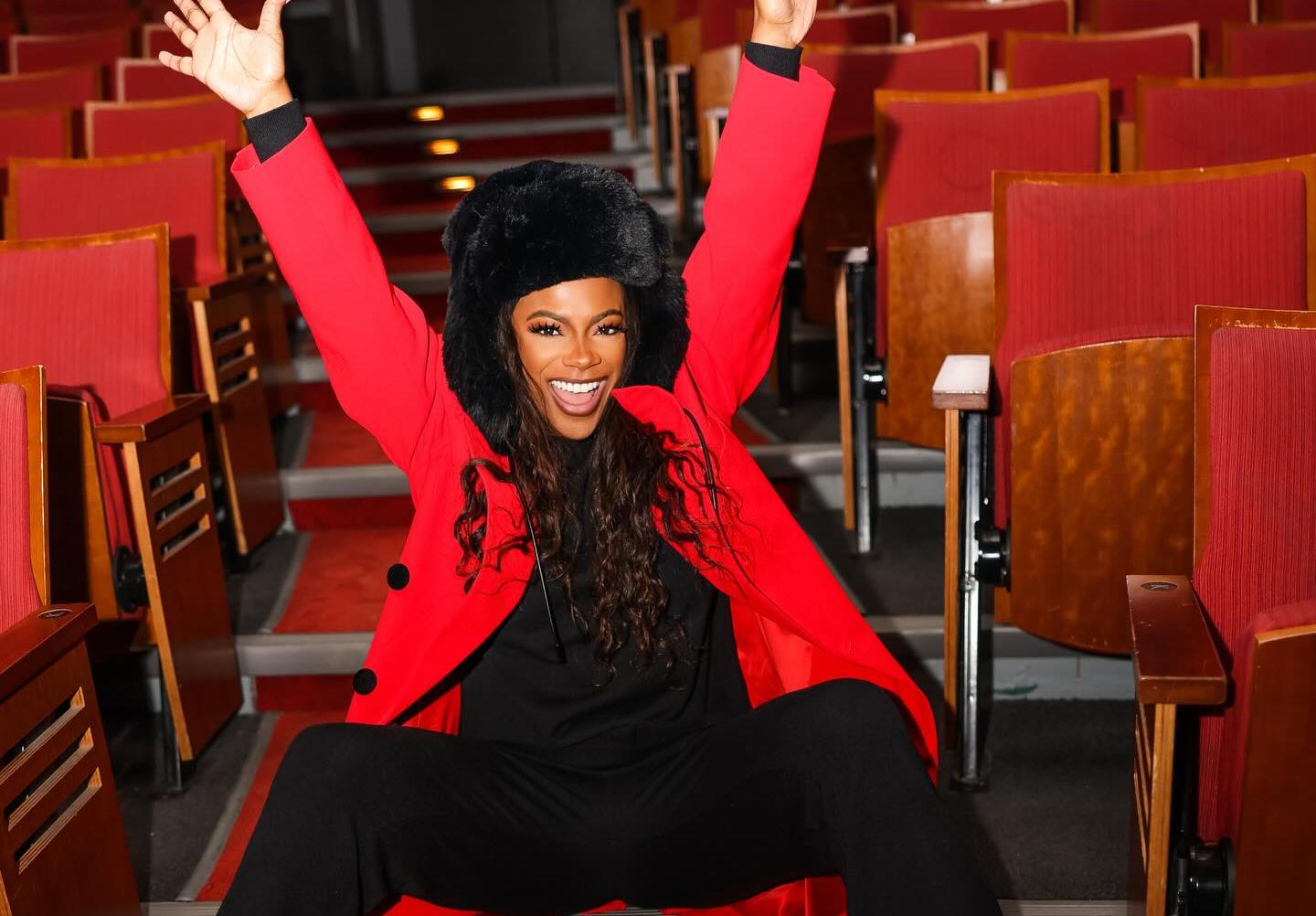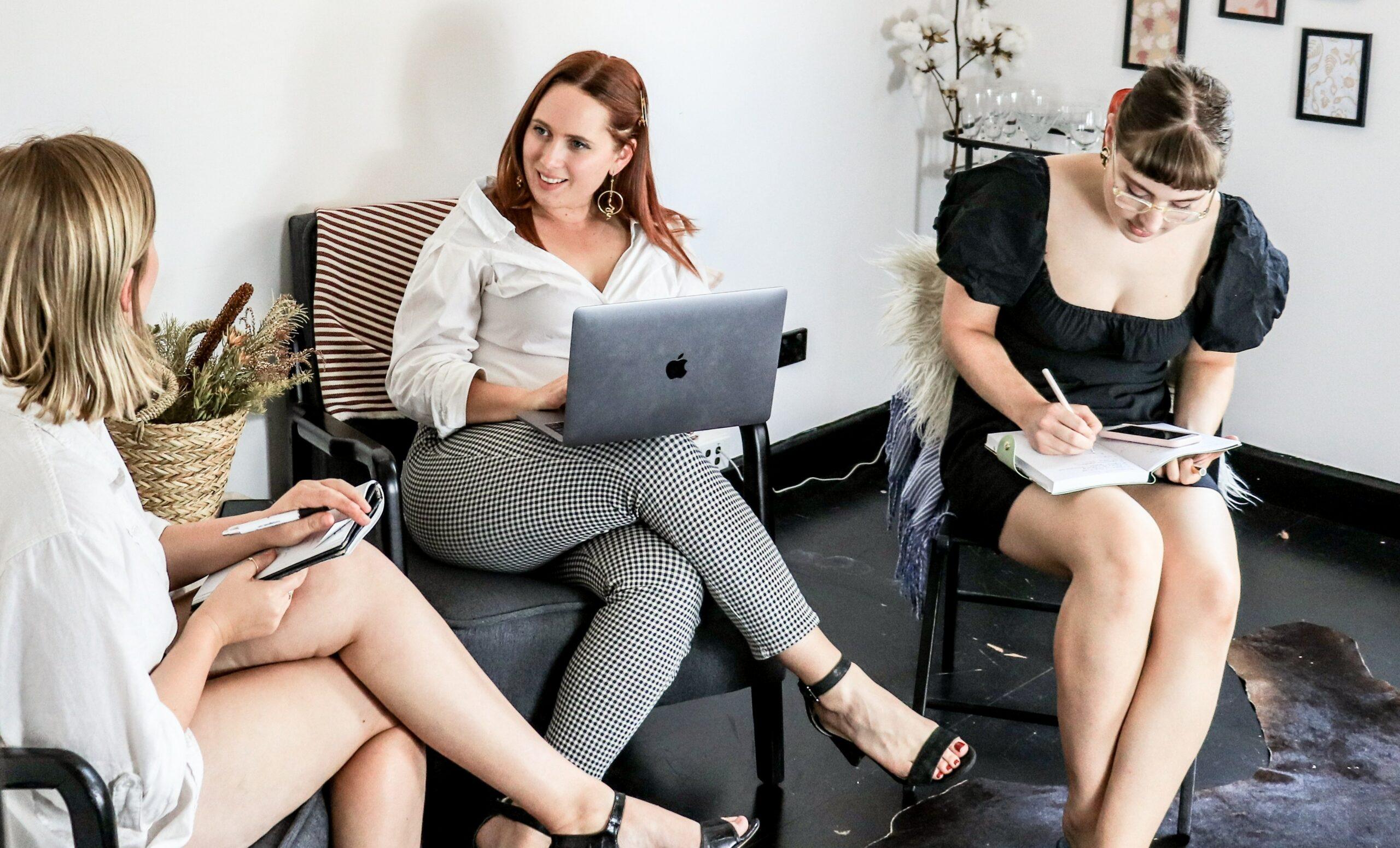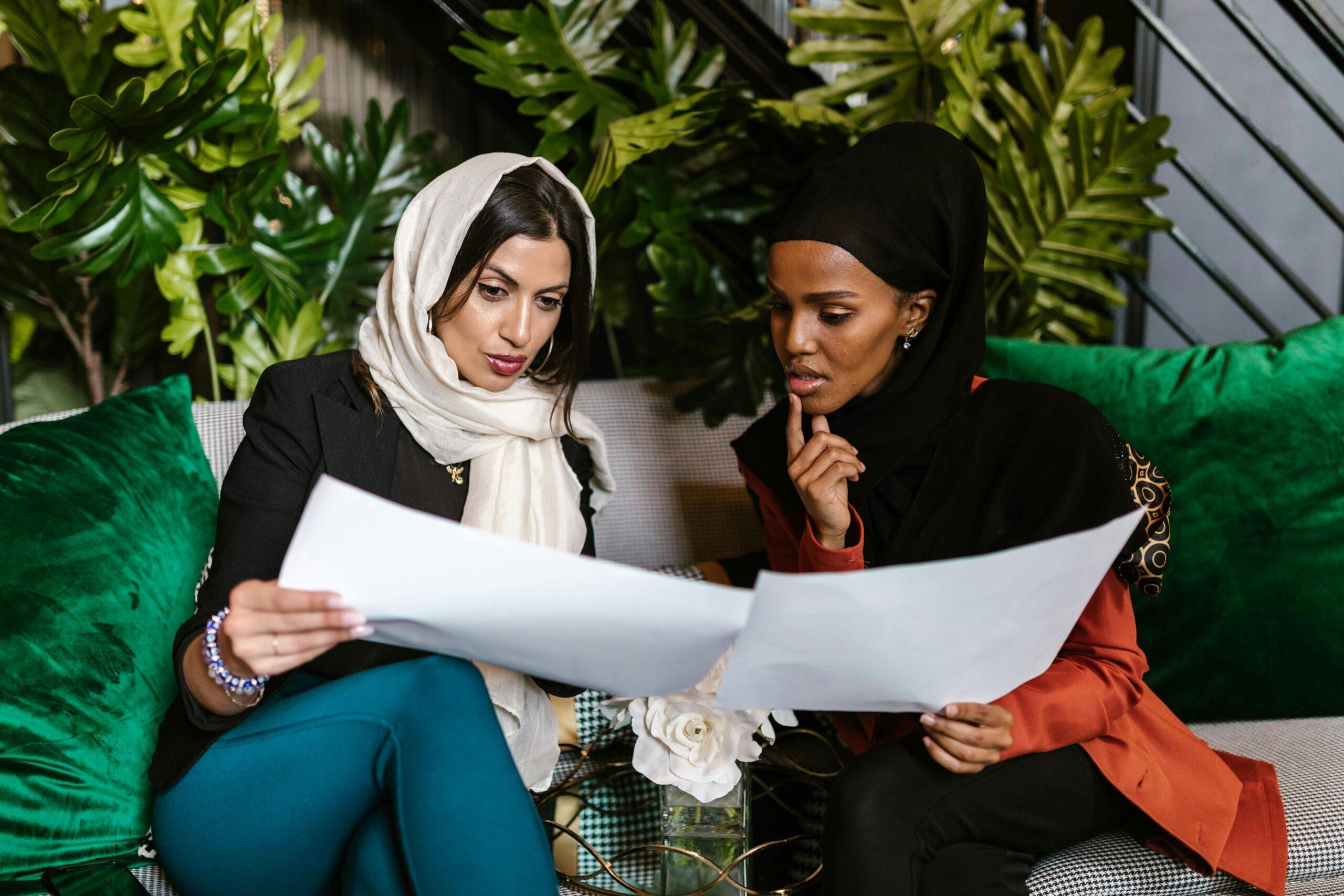Natasha S. Alford serves as the Vice President of Digital Content for theGrio, an anchor for theGrio TV, and a CNN Political Analyst. Beyond her roles in broadcast journalism, she taps into her cultural identity, upbringing, and her self-discovery to help further her stories and connect more with her audience. As a woman of African-American and Puerto Rican descent, Natasha covers stories within the Afro-Latinx diaspora that help illustrate the crossover between communities and the parallels between societal issues in the United States and Puerto Rico. In 2020, Natasha executively produced theGrio’s Afro-Latinx Revolution: Puerto Rico, a documentary that helps illustrate the racism and abuse Black Puerto Ricans face.
Natasha’s memoir, American Negra, takes a deeper dive into her upbringing and her journey through her journalism career. The book highlights her experience as a young girl of color growing up in Syracuse, NY, her experiences as an undergrad at Harvard University switching from finance to journalism, and navigating her lupus diagnosis at the height of her career. Throughout her journey, Natasha learned to understand the value of remaining true to herself and her story, and not allowing the need to appear perfect to the world to keep her from taking care of herself.
Her Agenda sat with Natasha to talk more about why she decided to open up about her roots, leaving a secure job at a top hedge fund to chase her journalism dreams, and the benefits she’s learned about valuing herself more than the institutions we strive to work for.
Her Agenda: Before your career as a journalist, you worked at the world’s largest hedge fund, Bridgewater Associates, and then you went on to teach. At what point, would you say, you received your calling to be a journalist?
Natasha S. Alford: The seeds were always there. When I was in high school, I was co-editor of the student newspaper. I felt a real power in using my words for good [and] using my words to shed light on important issues. But, I don’t think that I truly believed in my ability to pull off being a journalist until a little bit later. When I was an undergrad, there was no journalism track at my college, there was no journalism major. I sort of deviated a bit and, and chased different things at different points in my life. Ultimately, I came back to the core of both who I am as a person, and also what I think I’ve been called to do. That was part of the inspiration for telling that story in the book was that oftentimes, we think we have to become something different in order to really make a difference. When in fact, the core of who we are, those instincts that we have, the things that come naturally to us, they often are signs of what we are meant to do in the world. So, yeah, it was always there. But I didn’t truly pursue it in earnest until about five years after I graduated from college.
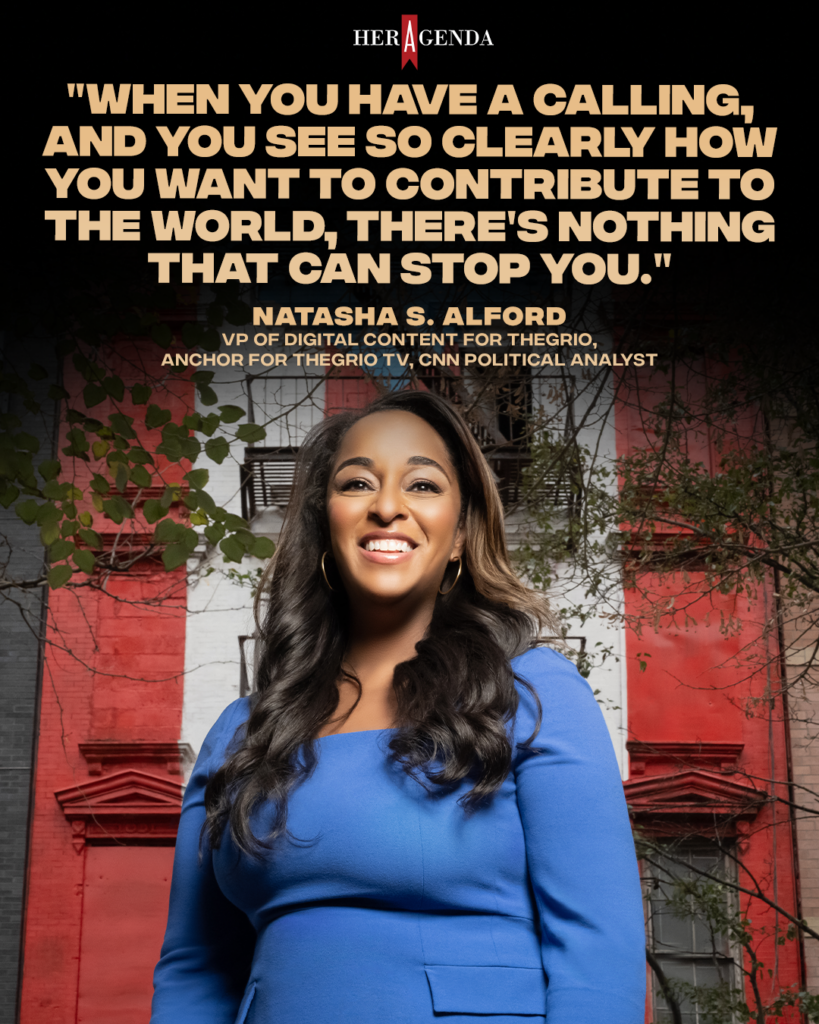
Her Agenda: Were there any fears that came from such a drastic career change?
Natasha S. Alford: Absolutely. Many of the fears were external, they were placed on me. I remember being so excited when I had the epiphany that, ‘Wow, this is what I should have always been doing.’ When I shared it with certain people, the reaction was, ‘How are you going to start all over?’ ‘You’re not going to make any money.’ ‘Journalism has changed.’ And, ‘If you start all over, you’re gonna have to start at the bottom.’ So, there was a lot of fear that I encountered that was external. It was others, perhaps out of a protective instinct, or just reacting with what they heard, who tried to dissuade me from doing it. But again, when you have a calling, and you see so clearly how you want to contribute to the world, there’s nothing that can stop you. Sometimes you have to incubate and protect your dream a bit before you share it with a ton of people.
There was fear, then there was also fear of failure. Pursuing journalism at 25, a time when many of my friends were settling down, starting families, buying homes, or getting more established, meant this feeling of being behind. I needed to make peace with that. I was willing to do something that maybe others wanted, so I could have a result that was different.
Her Agenda: You’re African American, and Puerto Rican and you also grew up in upstate New York, in Syracuse. As you were navigating your journalism career, and just starting to get your foot in the door, did you see many folks in the field who had a similar background to you or even looked like you?
Natasha S. Alford: Yeah, my biggest inspiration was Soledad O’Brien. At that point, she was the only person who I could point to who was a Black Latina. Her ethnic makeup is a little bit different. Her mother was Afro Cuban and I believe her father was white and mixed, but she was an example for me. Sunny Hostin was another person, at the time, who I looked up to. Although there weren’t many, just having those two examples made me feel like there are people who know what it means to do this job and to do so with their community in mind, with a sense of duty to make sure that they get stories right.
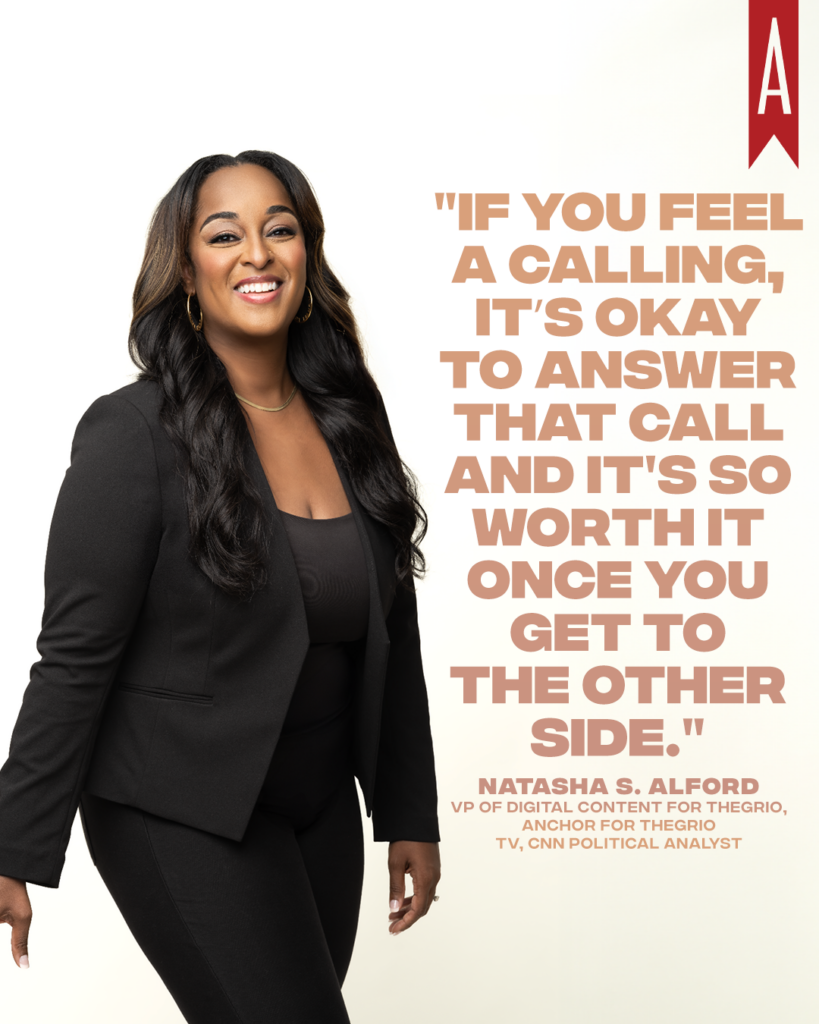
Her Agenda: And in your memoir, American Negra, you plan to cover these roots, and also your upbringing in America. Why did you want to touch on all of these layers of your life, like going into your ethnic background, and also navigating that within growing up in America and navigating the world through that lens too?
Natasha S. Alford: It’s an American experience that is just honestly overlooked. The way that we talk about communities and categorize people, we make these kinds of clean distinctions between groups that don’t always exist. I felt like there was an untold story. You have African Americans, who are often living side by side with Latinos of all races, by the way, and to think that there is no sort of interaction, no overlap, no shared history, that is an error. I wanted to uncover that history, I wanted to put a stake in the ground and say that this history matters.
When it comes to the Puerto Rican side of things, in particular, I think it’s important for the moment we’re in because Puerto Rico is a commonwealth of the US. We have these conversations about colonialism and imperialism, and the impact of [both]. We can’t overlook the fact that the US still has a colonial relationship with the islands. It’s more than a place that we go for vacation, it’s a place where social justice fights are happening right now. I think that was important for me to shed light on.
And lastly, this piece about racial justice. It’s a missed opportunity when we talk about racial justice, and we don’t consider the parallels in other places. There are many Black Puerto Ricans who are fighting for racial justice at the same time, as Black Americans are in this fight. There are parallel experiences with police brutality, those sorts of things. Even if we speak a different language, I think it’s important to make the effort to bring [these things] up in conversation with each other and that’s part of what the book tries to do.
I think so much of those tensions come from overlooked history, from not having those conversations. That is part of what I hope to do in a way that is responsible. So much of the dialogue on social media is oversimplified and plays up the tension and misses those opportunities for reaffirming our shared experience here in the US.
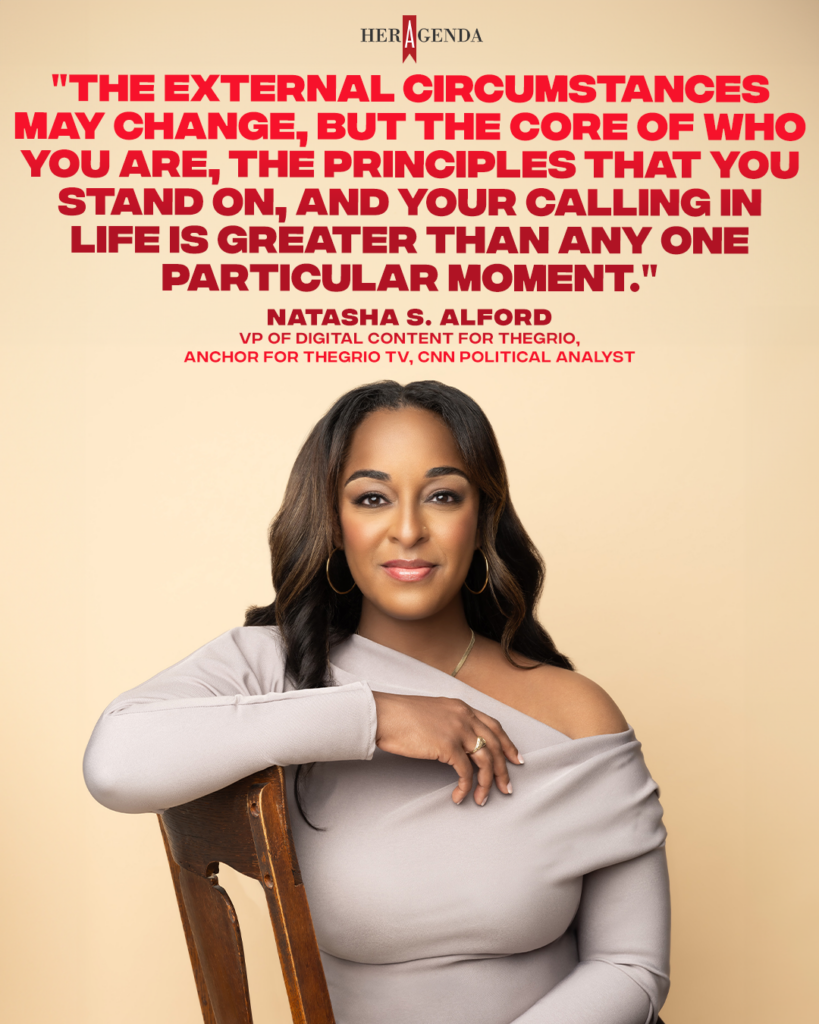
Her Agenda: Absolutely. Another area that you go into in the book, is your lupus diagnosis, happening at the brink of your budding journalism career. In other articles I’ve read, you talked about how there was a fear [and] discomfort you had about talking about this publicly, how did you work to overcome this discomfort? And do you think you fully think you worked through it to be able to talk about the diagnosis more and talk about how your health impacts the work you do?
Natasha S. Alford: It was definitely a journey, it did not happen overnight. Initially, I thought I would keep it a secret for as long as possible. And there was someone in my life who told me it’s a quote that we’ve heard before, that secrets make you sick. So, the work that it took to cover up the mixed emotions that I had, when I was going through something I didn’t want to tell people and, people just sort of had this impression of me that was the highlight reel, and they didn’t really know what I was going through, it created a sense of discomfort within me that wasn’t being honest. Also, there were people who maybe could have benefited from knowing that they weren’t alone, if they were in that fight or [a] similar fight. So, I spoke with my pastor, [and] I called trusted advisors in the media industry. I mean, it was a real process. I want to say [it was] over a year, at least, [of] talking about it, talking about the risks, trying to assess what I wanted to do with it. But it was so freeing once I did, and it made me kind of wish that I just kind of let it go earlier. When we tell our truth and we take off the mask, we free ourselves and we free others as well. And I would say that is maybe the positive side of social media, as critical as I can be of it. With people being more transparent about what they’re going through, we’ve normalized a lot that used to be taboo.
As far as where I’m at with it now, I’m doing it. I’ve done it. I was diagnosed in 2016, and I’ve continued to contribute as a journalist, I have developed a TV career, I’ve written a book, all these things have happened since. If anything, I’ve proven to myself that I can both manage my health and this condition and still do what I love. I hope that encourages someone else who needs to hear that maybe a little bit earlier in their journey to know that It’s very possible.
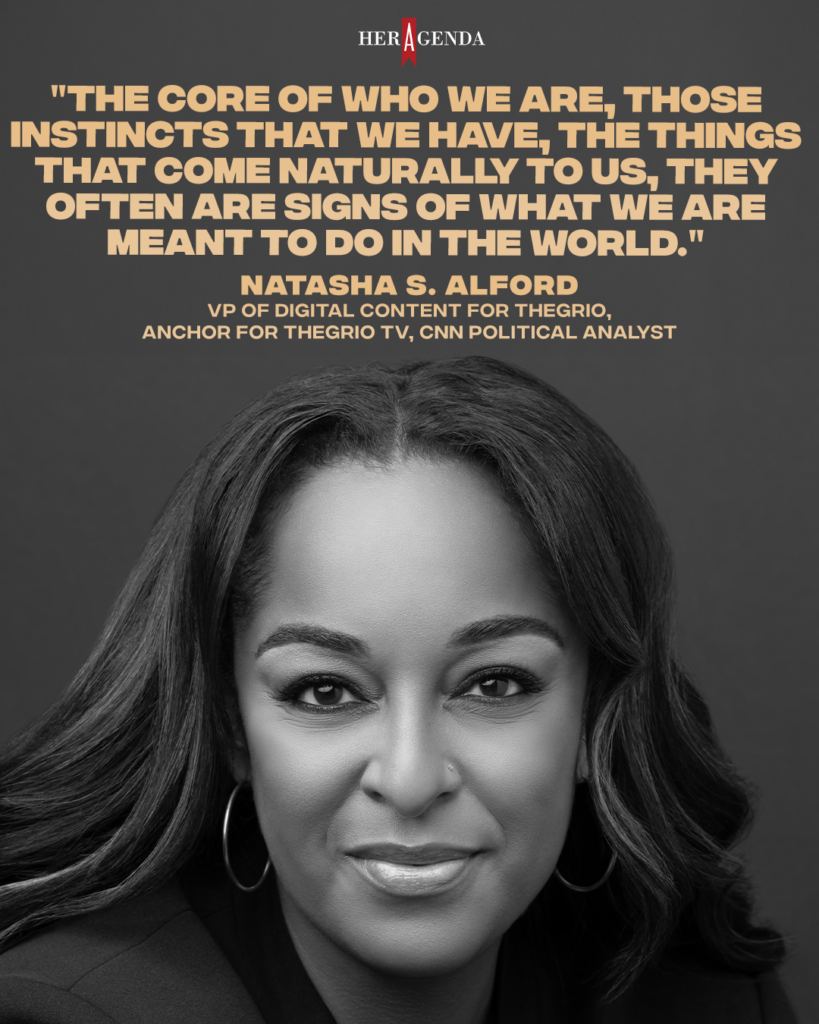
Her Agenda: How can we help change the connotation of the saying “work twice as hard” for young, ambitious professional women of color so that we don’t feel the need to hide a health condition or even have a personal family issue going on?
Natasha S. Alford: It’s funny, you ask that because I just published this article about Claudine Gay’s resignation and it opens up with this conversation of being twice as good. That’s literally the first line of the article. We know that ‘twice as good’ is guidance that we get that is well-intentioned. It is meant to protect us, it is meant to prepare us for a world in which we will be facing double standards all of our lives. But what really changed the way I look at this was an article called Contingencies of Self Worth. In summary, it just means that your self-worth cannot be contingent upon someone else’s judgment. If it is, you will always be at the mercy of their judgment. You can do all the things, you can get all the degrees, you can make all the money, you can gain access to all of these circles but if you’re relying on those people, and those institutions and those factors to give you self worth, that can be taken away from you at any time. What we need to shift to is teaching the inherent value of ourselves that we hold, just by existing just by the miracle of our survival. We have to see our worth and find our worth in that, and not in accomplishments or the outside world’s definition. There’s the reality of understanding what we’re up against, but that doesn’t mean that we have to conform in terms of how we actually value ourselves. So, I believe that’s the foundation for building everything, right? If you have that sense of self, then you can go out into the world and you can achieve [it]. You can get knocked down, you can make your mistakes, and never lose yourself. Because at the end of the day you are your best thing. That’s how I’ve been approaching it.
Her Agenda: With your openness on your lupus diagnosis, your documentary ‘Afro Latinx Revolution: Puerto Rico’ and your upcoming memoir, and even your TED Talk on “The Courage to Report,’ you do a great job of interweaving your personal stories to amplify the voices of others. Why do you think it’s important to share your journey with the world within your work?
Natasha S. Alford: You know I think about that often because the choice of writing this book to make it a memoir was an intentional one. I could have easily just written the history book and left it at that. I think there’s something about telling your personal story that makes it less debatable. We’re in this time where everything feels up for debate, feels more partisan and more divisive than ever. Choosing the personal narrative is a tool for me. I hope that it makes an audience a little bit more receptive [and] more open when I’m saying that this is my lived experience. This is a journey I’ve been on for 37 years, I’m 37 years old, and it’s a constant reflection that is happening. It’s a journey of making meaning of my life, but also, how I’m situated in the world. So, in some ways, it’s to create an openness. I’m not telling people how to think, I’m telling them what I’ve experienced. From there, they can draw their own lessons. There are certain people who, again, may have the same kind of label as me. They may be African American, they may be Puerto Rican, they may be from upstate New York, however, they identify with my experience. By saying that I’m here and telling my story, I hope it makes [my community] feel more empowered to tell their own [stories] and to know that it matters.
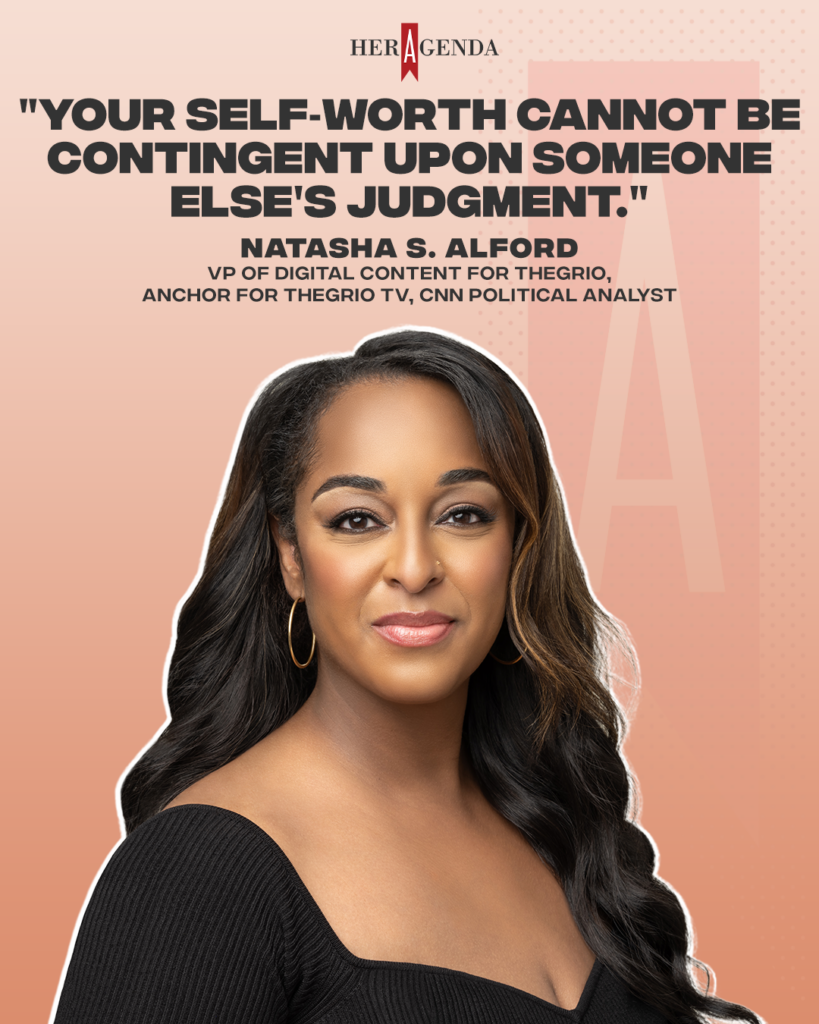
Her Agenda: What key points do you hope readers take away from American Negra?
Natasha S. Alford: There are two stories being told here. There is a story of overlooked history that I’m intentionally centering as an American story, this question of what it means to be Black and Latino and to do so in the United States context. I feel like that story needs to be told. The second story is a coming-of-age story. It’s about finding your truest self. It’s about taking off the masks and taking off what others project on you or expect you to be to be successful and to find success on your own terms. That, to me, is a universal story. [It] doesn’t matter where you come from, it’s something that I think anybody will benefit from hearing. And, reflecting on where they’re at, in their life, where they’re at in that journey, whether they’re closer to having figured it out, or whether they’re ready to step out on faith and try to make that happen. I want to affirm for those who are ready to step out that you can see victory on the other side. [You should] know that no matter what you were told is too hard, what you’re told is not for you, what you’re told doesn’t matter. If you feel a calling, it’s okay to answer that [call] and it’s so worth it once you get to the other side.
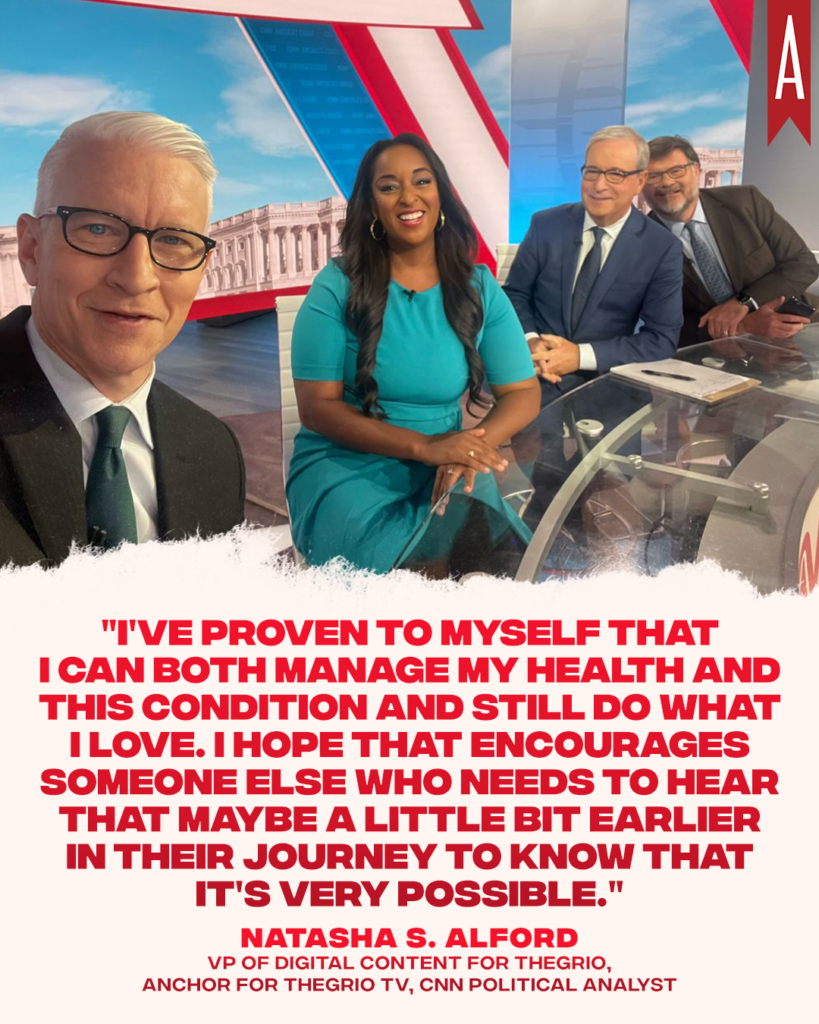
Her Agenda: This is an interesting question to end on, but I’m gonna go for it. You told us that your journey is definitely a millennial journey. I’m curious, what did you mean by this when you said that?
Natasha S. Alford: Millennials, we have this reputation for constantly being on the move, not staying at a job for too long. We’re allegedly not as demanding as Gen Z, but we were more demanding than the generation that came before us in terms of wanting jobs, satisfaction, and purpose. So yeah, I was the stereotypical millennial for a long time. Think about all those chapters in the book where I’m changing jobs [and] I’m moving cities. I’m telling my parents, ‘this is the one, this is what I’m supposed to be doing.’ All of the concern that was created in my family about [am I] going to settle down, you know, have [I] figured it out? I want to make space for that, and I want to elevate that, that is okay. We’re not a generation that goes to one job and stays there for 20 years, this is a changing world. It is okay to be in pursuit [and] it is okay to be a bit of a wanderer if you’re doing so, knowing that you’re trying to get closer and closer to you truly are.
In my case, I was told that journalism wasn’t worth pursuing at the time that I was pursuing it. Now, I look at the world around me and I say, ‘Wow, journalism is more important than ever,’ I feel perfectly positioned in this moment to do my job at a time when the stakes are so high for telling stories. We’re literally in a battle for democracy and it rests, in many ways, on information and knowledge. What an assignment, what an opportunity. If I hadn’t listened to that call, now almost 10 years ago, I wouldn’t be in position for this moment. We also have to recognize that the external circumstances may change, but the core of who you are, the principles that you stand on, and your calling in life is greater than any one particular moment.
[Editor’s note: This interview has been edited for length and clarity.]

